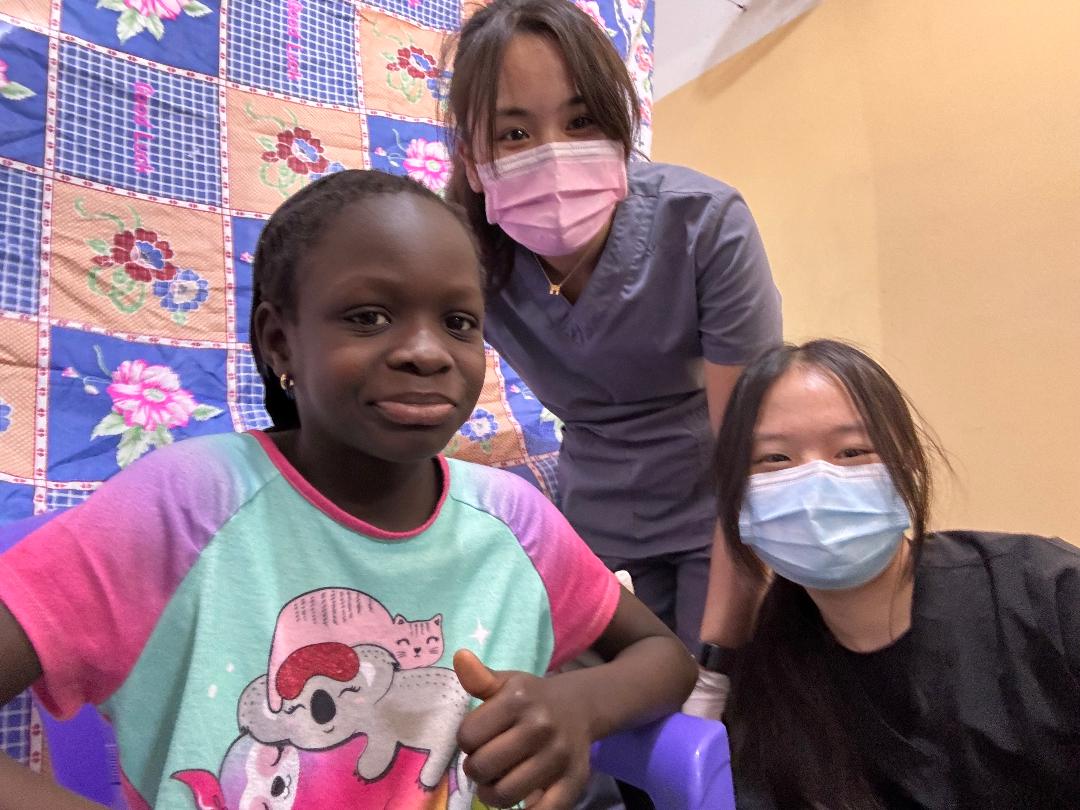Just a few weeks ago, I returned from a once-in-a-lifetime experience as a volunteer with the Africa Cries Out group in Senegal. I first heard about the trip from my uncle, Dr. Haibin Wang, and my cousin, Alex, who had gone in 2023. He shared pictures of the villages he visited and told me about the patients who touched his heart. At the time, I was still deciding between dental and medical school, but I knew I had to go to Senegal as soon as I had the chance. After graduating from college, I took a gap year to work on my medical school application and told my uncle I wanted to join him on the trip. He was initially worried and warned me not to expect a typical “vacation.” Despite his concerns, I convinced him that I was ready to do whatever it took to help.
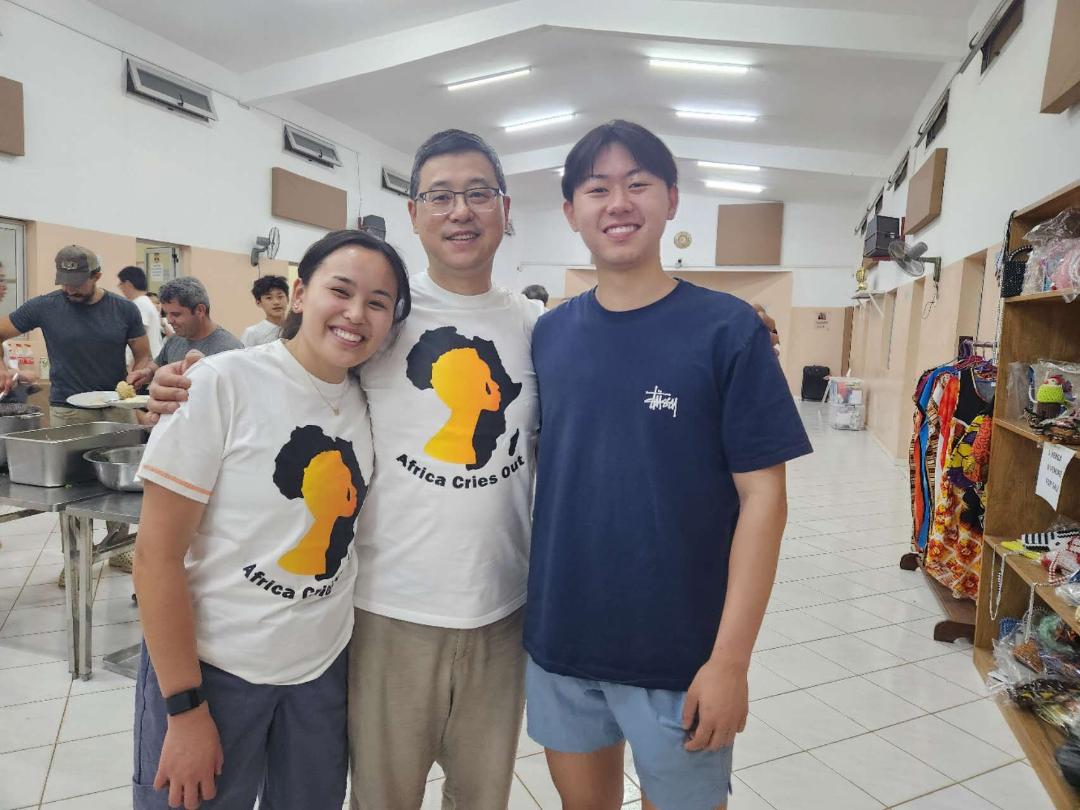 With my uncle Dr. Wang, and cousin, Alex.
With my uncle Dr. Wang, and cousin, Alex.
Upon arriving in Senegal, we were immediately immersed in the culture. I had never seen such beautiful, rolling plains interspersed with modest, rural dwellings. Along the long roads, small, self-sufficient villages appeared every few miles. On our first day, we journeyed to the Kedougou area to visit a leprosy village. As we left in the early morning, the sun was rising, and I saw a group of runners bounding down the side of the highway. As a runner myself, I found this grounding and realized that even though I lived an ocean away from the local Senegalese people, we still shared common interests.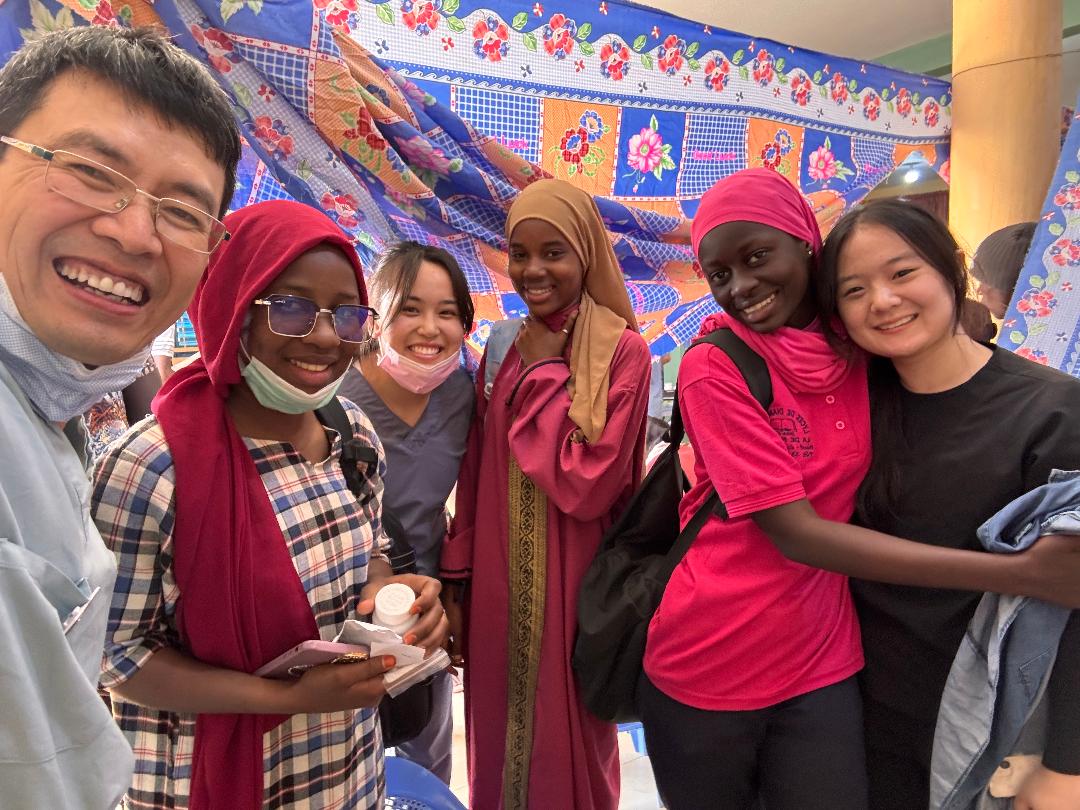
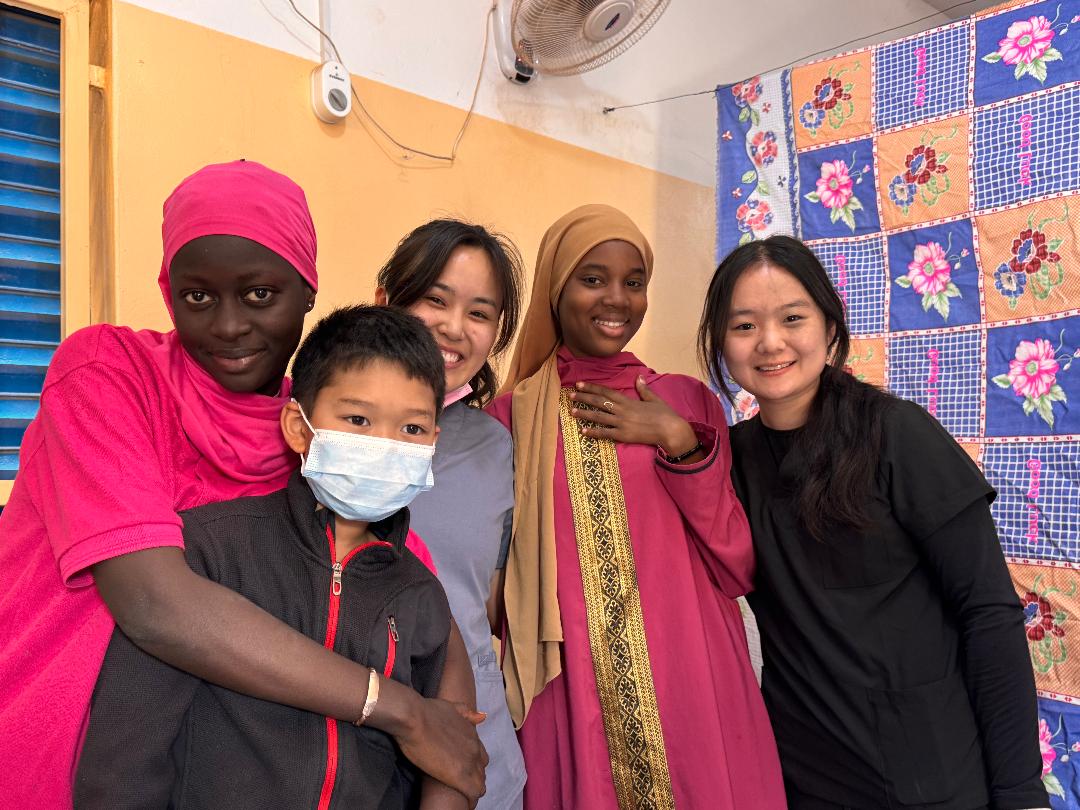 With other volunteers and the beautiful people of Senegal.
With other volunteers and the beautiful people of Senegal.
In Fadaigo, we heard the inspiring story of Dr. Faye. In the U.S., we often associate doctors with high salaries and may look down on those in lower-paying specialties. But Dr. Faye demonstrated the true goodness of the human spirit, doing all he could for the people who needed it most. After a bumpy truck ride to Djinjin, we met a group of local children who were overjoyed to receive toys and snacks from the group. When we began treating patients, I faced my first challenge with translation, a struggle we encountered again in Sindia, Ndoine, and Diamnadio. No matter where we went, it was difficult to fully understand the patient’s symptoms. Complaints of body aches, chest pain, acid reflux, hypertension, stomach aches, insomnia, and anemia seemed endless.
Beyond the translators’ skills, discomfort in discussing personal details made it difficult to fully grasp the pain patients were experiencing. I was left feeling torn; we had helped them, but it didn’t feel like enough. After shadowing Dr. Chao and Dr. Wang, they reassured me that my concerns were valid, but this is how rural medicine works. They reminded me that, more than healthcare, we provided the patients with a symbol of hope. As the American writer Orison Swett Marden once said, “There is no medicine like hope, no incentive so great, and no tonic so powerful as the expectation of something tomorrow.
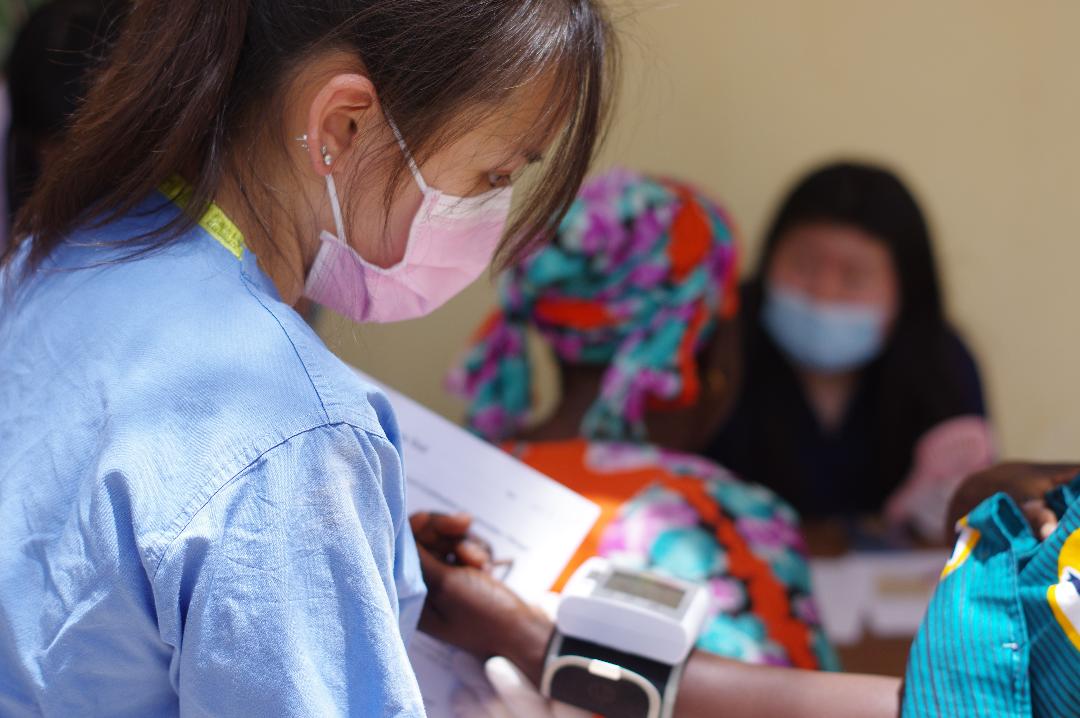 Getting a hands-on experience of how to treat and care for patients.
Getting a hands-on experience of how to treat and care for patients.
One patient I remember well was a young woman I met while working as part of the vitals team in Sindia. She approached me with shaky hands, and when I looked at her intake form, I realized she was my age. I was shocked to see that she had two young children. I was struck again by how different our lives were. I looked back at the long line of waiting patients and took a deep breath to calm myself. When I turned back, I noticed my first blood pressure reading was too high for someone my age. I knew something was wrong and noticed how anxious she looked. I decided to try again. Gently, I took her forearm and rested it against mine, took off my mask, and looked into her eyes to help her mimic my breathing. Eventually, she smiled, and once I felt she was calmer, I took the reading again. This time, it was much more accurate. I was relieved that, with her vitals now correct, I could send her to triage without worrying about an incorrect reading. This technique not only helped streamline the process but also allowed the clinic to run more smoothly.
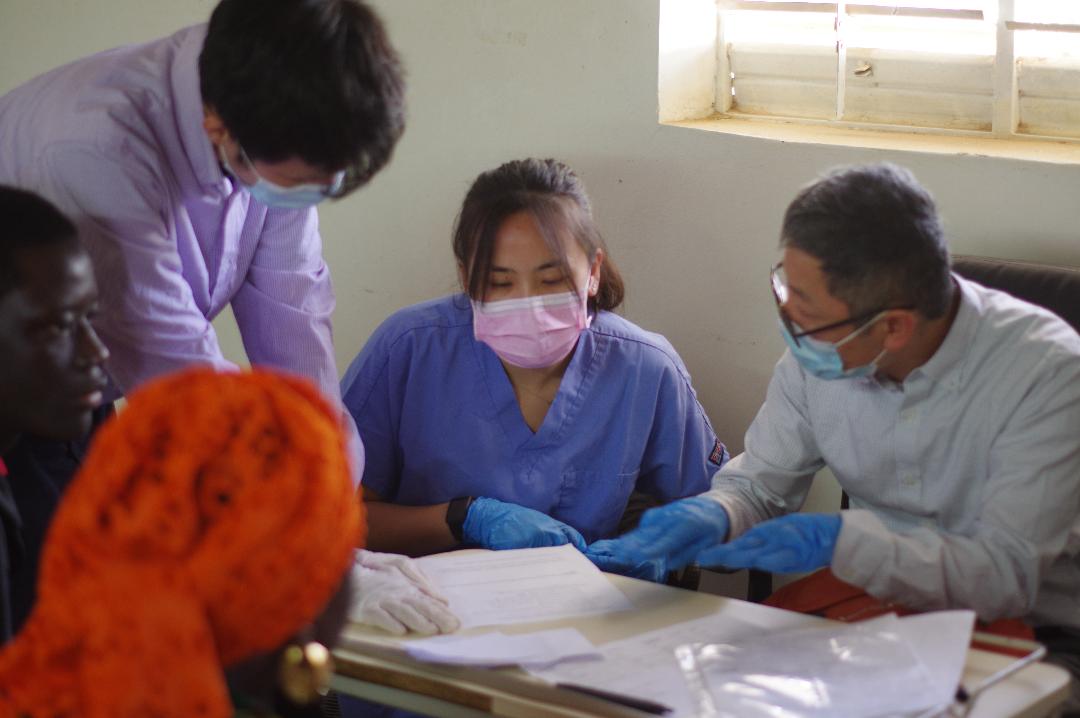 Interacting with patients and doctors was really an eye opener for me, and really directed me to what I would pursue.
Interacting with patients and doctors was really an eye opener for me, and really directed me to what I would pursue.
Through the long, hot days, I learned a lot about our role as volunteers, and the trip to Senegal far exceeded my expectations. I finally gained the first-hand medical experience I had craved before going to medical school, and I felt fulfilled by my career choice. I hadn’t expected to feel sad to leave, but on my last day, as I woke to the sound of a man singing Arabic songs in the distance, I found myself grateful for the experience. We were in a tough situation, caring for as many people as we could, as quickly as we could. But by following the lead of the talented doctors in the group, I saw that medicine is not just one thing. It’s more than a single career. It’s about being healers, educators, counselors, therapists, and friends to patients in their time of need.
***************************************************************************************
If you are moved and willing to support our African ministry, here are ways to help/donate:
1)Please write a check to Africa Cries Out and send it to Jun Xu, MD, 1171 E Putnam Avenue, Riverside, CT06878, USA. You will receive a tax-free receipt recognized by the IRS.
2) Online Credit Card Donation: https://africacriesout.net/ (credit card company will charge a handling fee)
3)Zelle: Africacriesout@gmail.com
Our team solemnly declares that 100% of your donation will be used for the people of Africa, and we do not get even a penny of administrative fees.
Jun Xu WeChat: jun9174343767
Email: Africacriesout@gmail.com
Public WeChat account: Life Exploring (人生天路)
Web page: https://africacriesout.net
Translation: Robben, Jiang Muyun
Reviewer: Wang Yizun, Tu Shuyue
Editor: Doris Cruz

